TOUMBOUCTOU – TIMBUKTU – TOUMBOUKTU
by Barbara on Apr.19, 2012, under Published Travel Articles
The Sunday Independent October 2012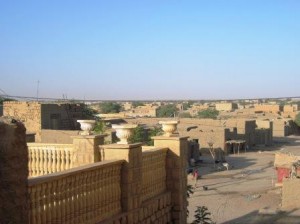 For most people, says Monsieur Jaro, when you say Toumbouctou, it is like the end of the world, for others it is a place that is not there, but that is not true. I am from Toumbouctou, and I can tell you that we are right at the heart of the world.
For most people, says Monsieur Jaro, when you say Toumbouctou, it is like the end of the world, for others it is a place that is not there, but that is not true. I am from Toumbouctou, and I can tell you that we are right at the heart of the world.
She sits on the first of the two steps at the entrance of the hotel, the steps are sandy, the sand from the desert street, she wipes the sand off her fingers, it sticks to them for they are wet, sweat salt, her back leans against the white brown walls that stretch two stories high; the stairs are at the front doorway, the wooden door with silver coloured inlay is open, voice sounds within. The hotel, more like a house than a hotel, is a small hotel; it has six rooms and a restaurant on the roof, the roof is on the second floor of the building, the restaurant is open to the sky, a home for passing travellers.
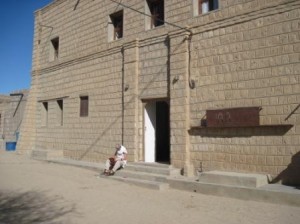 Still, she sits on the stairs in front of the hotel and looks out at the sand road, the dust that the wind blows up fuses with the heat to make a haze, she has a hazed view, she takes the tobacco pouch from her bag and rolls a cigarette, she hopes that she looks like Sam Spade as he rolled his cigarette in San Francisco, but she knows that Sam Spade never was in Toumbouctou, she would like to look like Sam Spade as she sits on the first of the two stairs and rolls a cigarette.
Still, she sits on the stairs in front of the hotel and looks out at the sand road, the dust that the wind blows up fuses with the heat to make a haze, she has a hazed view, she takes the tobacco pouch from her bag and rolls a cigarette, she hopes that she looks like Sam Spade as he rolled his cigarette in San Francisco, but she knows that Sam Spade never was in Toumbouctou, she would like to look like Sam Spade as she sits on the first of the two stairs and rolls a cigarette.
Voices sound, words speak breaking the waves BBC News, November 2011: An armed gang of kidnappers has abducted three tourists and killed a fourth in the city of Timbuktu in northern Mali. They were abducted from a restaurant in an upmarket boutique hotel. Two of the hostages are Dutch and the third a South African who may have lived in the UK. The dead man, said to be German, was shot dead trying to resist the gang. It is believed to be the first time foreigners have been abducted in Timbuktu, once popular with tourists.
She raises her head; in front of her, but slightly to the left, is a motorbike, the initials KTM are painted on its side, an Austrian motorbike whose name is a brand, a Chinese knockoff, a small affordable gift, a gift in exchange for a gift, a gift from one culture to another, gifts are never free. A man who wears a white turban wrapped around his face and neck stands next to the motorbike, he is ageless for the white turban covers his face fully, except for the eyes, the black eyes look at her, the eyes of a predator, in a moment he will bend down and adjust a rivet that is near the petrol tank, the tank is situated on the left rear of the motorbike, if you stand behind it, and to the right rear if you stand in front of it. The motorbike is red and green and white, a bird machine. The man stands behind it, next to the silver exhaust pipe. There is a shop across from where she sits on the first of the second sand covered stairs, it has bottles lined up outside it, the bottles are filled with a yellow viscous liquid, petrol, there are no petrol stations in Toumbouctou, it is not necessary to go to a petrol station should you need petrol for this gift from China, it needs only a bottle filled to the brim, one litre of petrol, to drive for seven hours, seven days, to drive for on a far away road. She imagines that the man who adjusts the rivet of the motorbike has a hawk like nose, it will curve as the beak of a bird will curve, long, Semitic, it will cast a shadow over his full red lips. He leaves the motorbike and walks across the road, he holds money out in his hand and takes a bottle of petrol from a jet black young boy, she watches how his fingers curl around the bottle, she watches the young boy as he wipes a fly from his nose, his nose is wide, a wide angled nose. The man in the white turban pours the petrol into the tank of the motorbike, then, once again he walks across the road, the sand road, and hands the bottle to the boy, the boy holds the bottle to his nose, petrol fumes, a liquid dance. The man with the nose that may be long and whose eyes are predatory climbs on the motorbike and then he is far away.
To the right of the bottles in which the yellow liquid flows, and to the right of the man who is no longer there but who still wears the white turban and whose nose still, possible, casts a shadow over his lips, is a telephone pole, or an electrical pole, a bee hovers above her ears, the wires strung between the poles. The poles are tall, they hold a cable which is stretched across the road, stretched between one pole and another pole, on the cable, or possible the wire, is a cat, two cats, dead cats, their fur is black and dry.
Cats are witches, says Monsieur Babba, the cats that hang from the poles in Toumbouctou are witches that come in the night and search for souls, the souls of women, the souls of the old, the souls of children; not the souls of men for men are strong and so the cat witches are afraid. Because of this young boys, boys who will soon become men and who do not want not to grow before they are men, decide that there should be no cats in Toumbouctou, so they catch and kill the cats and then throw them upwards towards the stars so they land across the cables, suspended, hung in the wind. Cats are not for eating, but the young boys eat them, only the young boys eat these cats for they taste good and you never know, maybe by eating the flesh of a witch you can absorb witch power, adults do not eat these cats for although they may want witch power cats are not Halal and adults subscribe to the tenets of Islam, cats are inedible, they are dirty, but the young boys eat them and they taste, they say they taste good.
It is dry in this desert town so the cats that hang from the telephone, or the electricity, cables, soon dry out and become skeletons, but they are not all skeletons, some of the cats that hang on the cables that stretch across the road, from left to right, or from north to south, have not yet dried out, they have flesh and hair. Their mouths open, they purr the sound of a bee.
The sounds in the entrance of the hotel grow louder, Shindouk, the Tuareg, a pirate of the Sahara, as Brion Gysin called these fierce people, follows her up the staircase, his face is covered in blue, indigo blue Tuareg robes that stain the skin, Shindouk is the man who met her at the harbour, the man who met her as she climbed off the boat at the end of the Niger river, the end of the river for her as rivers never do have an end, they rise and fall and become a beginning and an end, takes her by the arm, return, he says, return inside, it is not safe, for this she is grateful for the sun on the first of the two sand stairs on which she sits is hot.
She rises and walks up the two stairs, there are more words, words that speak of reservations, does she have a reservation, where is the reservation, what if there is no reservation, the small hotel is not occupied. Reuters, November 2011: A group linked to al-Qaeda has attacked Westerners in regions near to Timbuktu. Following several kidnappings it is advised that non Islamic/Western people should not to travel to northern Mali, including Timbuktu. Timbuktu is one of the many former tourist destinations in Mali that foreign embassies have deemed too dangerous for visitors due to the risk of kidnapping by Aqim. The Foreign Office website says there is a high threat from terrorism in Mali. Further kidnap attempts are likely.
She walks into the central courtyard of the hotel, in the courtyard there is a pond, a long rectangular shaped pond, in the pond is a fountain, a peacock shaped fountain made of metal is in its centre, the rectangular bath which holds the water is a grey concrete, there is no water in the pond and the fountain does not flow. In front of her are two wooden doors, they are closed, to the left are two wooden doors, they are closed, to the right are two wooden doors, they are closed. The hotel is silent, empty, a desert in a desert. It is cool inside this grey walled building, the walls are smooth as if they are made of plaster but they are not plaster they are mud. The courtyard is open to the sky, above her the blue curves overhead, there is no sound, not even a bird that flies above. The courtyard is empty. She climbs the staircase to the roof, the roof restaurant, and looks out at the mud walled buildings; no children walk the streets, silence. I have travelled the desert with the salt caravans, Shindouk says, many many days of travel, many many days, weeks I walked beside the camel who carried the salt, the Europeans when they reached Toumbouctou, knew the wealth of the salt, as he speaks he hands her a tablet of salt, it is heavy, white splashed with black, they said the inhabitants were very rich, salt is in very short supply, it is carried here from Tegaza, 500 miles from Toumbouctou. A load of salt was sold for 80 ducats and the king had a rich treasure of gold coins and ingots.
She takes the hand of her companion, we are in Toumbouctou, she says, this is a faraway place that is so very faraway.
National Geographic, March 2008. In 1824 the Paris-based Societe de Geographie offered a 10 000 franc prize to the first European to reach Toumbouctou. The Scotsman Gordon Laing arrived in Toumbouctuo in August 1826 but he was killed a month after he got there by local inhabitants who feared European invasion and appropriation and destruction. Unfortunately Gordon Laing was unable to claim the 10 000 francs. The Frenchman Rene Caillie arrived there in 1828, he traveled alone, in disguise, he spoke Arabic, he was a disguised Muslim. He stayed in Toumbouctou for six months, he then returned safely to Paris and claimed the 10 000 francs.
In 1723 Leo Africanus wrote the rich king of Toumbouctou hath many plates and sceptres of gold, some weighing more than 1300 pounds; he hath always 3000 horsemen and a great store of doctors, judges, priests and other learned men that are bountifully maintained at the kings cost and charges
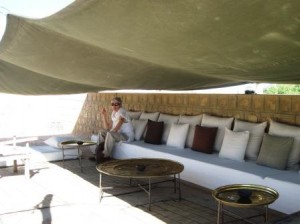 She is alone, and she is not alone, she is in a place where there is only the other, the other who may smile and yet is hostile, who may be violent and yet is welcoming. She sits on the white cushions that are under the shade of a turquoise awning, the awning is stretched between two wooden stakes, the stakes rest on the roof, they may be moved for the sun will always follow a path across the sky, and as it moves so too will the shadows, soon it will be hot sitting on these cushions as there will be no shade unless the poles are moved and the turquoise awning is moved, but now there is shade, it is cool under the turquoise awning, slowly, or possible not slowly depending upon what time means, the sun moves across the sky, there are no clouds in the sky, it is very blue, very blue and very big, but never sheltering. She gets up and walks to the eastern side of the roof and looks out, the eastern side of the city is before her, somewhere the edge of the desert begins but she is not certain where it begins for the desert starts in the streets of Toumbouctou, the desert starts in between the mud buildings, the encampments made of canvas and wood, the desert starts where the sand begins and the sand begins where it begins.
She is alone, and she is not alone, she is in a place where there is only the other, the other who may smile and yet is hostile, who may be violent and yet is welcoming. She sits on the white cushions that are under the shade of a turquoise awning, the awning is stretched between two wooden stakes, the stakes rest on the roof, they may be moved for the sun will always follow a path across the sky, and as it moves so too will the shadows, soon it will be hot sitting on these cushions as there will be no shade unless the poles are moved and the turquoise awning is moved, but now there is shade, it is cool under the turquoise awning, slowly, or possible not slowly depending upon what time means, the sun moves across the sky, there are no clouds in the sky, it is very blue, very blue and very big, but never sheltering. She gets up and walks to the eastern side of the roof and looks out, the eastern side of the city is before her, somewhere the edge of the desert begins but she is not certain where it begins for the desert starts in the streets of Toumbouctou, the desert starts in between the mud buildings, the encampments made of canvas and wood, the desert starts where the sand begins and the sand begins where it begins.
There is no movement, nothing moves. She turns to her companion, we are being crowned as kings are crowned, we are being crowned by our own solitude in this desert city, no-one hears, there is nothing that is familiar, there is stillness, a fearful stillness, our a knowledge of fear presupposes a memory of not being afraid, and we are always afraid. But here, even memory disappears; nothing is left but the sound of your heart, your breath, I can hear it now. It is a strange process, this integration of aloneness, it begins inside, will I fight against it and insist on remaining the person that I was and will always be, or can I let it take its course?
You will let it take its course, he replies.
On 19 April 2011 the Embassy in Bamako alerted its nationals of a very high risk of being kidnapped in Mali and Niger particularly between the city of Mopti and the border with Burkina Faso.
She looks at the mud buildings, all of them have flat roofs and small windows, they are built for the sun and the wind, the Hamatan that blows in the winter, a hot wind that makes people mad for it has no beginning and no end, it is endless, never stopping, it blows the heat and it blows the heat and the sand and it blows always. She wonders if she is crazy.
She walks over to the west, this is where the sun will descend to, the west is where it ends, the sun ends, for it will always rise in the east, to the west of the roof restaurant of the hotel with six rooms is a monument, a monument to the 1996 Tuareg uprising, it hangs, reaches, over the street that is made of sand. That, Shindouk says, is my memorial, in 1996, under the Konaré government 3000 guns were burned in a ceremony called the flame of peace, to commemorate this ceremony a monument was built.
And the guns, the 3000 guns, they burn again.
She looks out, the city is empty, there are no people on the streets that are made of sand, except an old man who crouches in the shade of a doorway, he blows the amber coals in a brazier, he makes tea, the mint tea that everyone in the city drinks, the mint tea that is made in China for the Chinese bear gifts and bring tea to this far off desert city. And there are no visitors, no people who wear hats and sunglasses to shade them from the sun that is slowly, or possible not slowly, descending westward, there are no tourists there are no people who are pale, white, foreign. Foreign Office warning: If you are travelling to Mali as part of an organised tour you should confirm with the organisers that they are aware of our travel advice and that they can confirm in writing that their travel insurance still applies. You should also be aware that the local governments in the region are also attacked by AQ-M. The security forces in Mali, Niger and Mauritania have all suffered fatalities. You should be aware that the long-standing policy of this government is not to make substantive concessions to hostage takers. The government considers that paying ransoms and releasing prisoners increases the risk of further hostage taking.
She accompanies Shindouk, the pirate of the desert, to the Sankore Mosque, she hides in his indigo robes.
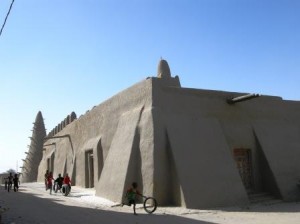 There is a plaque at the entrance of the Mosque, next to it is a photograph, it has faded so she is unable to make out the features of the building, a photograph of the Mosque, the Mosque before her, to read is always to forget:
There is a plaque at the entrance of the Mosque, next to it is a photograph, it has faded so she is unable to make out the features of the building, a photograph of the Mosque, the Mosque before her, to read is always to forget:
- The Sankore Mosque is built of a clay like mud called banco, a substance manually mixed on the building site; it is made up of clay soil, sand and various straw substances.
- The building is held up with the straight wooden logs of the Doum palm tree.
- Once a year, after the rains have fallen, the mud starts to loose its grasp on the wooden poles, the wooden poles despite being durable, thick and robust, are still however susceptible to termites.
- The mud is mixed with Karite, this is a gum like substance that comes from the Karite tree, or Villelaria Paradoxa, this gum like substance is used like butter to binds the mud, in this way the mud does not dissolve as quickly or flow from the building as it would if there was nothing to bind it.
- The butter of the Karite tree is called shea butter and comes from the nuts of the tree. It is a solid white fat that when heated becomes an emulsion that can be dissolved in water. It is then mixed in with the mixture of sand and clay.
- The use of shea butter in the finishing coat of clay significantly increases its durability in relation to both sun and rain.
- The Sankore Mosque is a world heritage site.
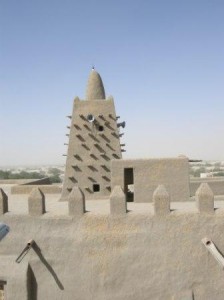
She walks to the walls of the Mosque; she cannot go inside for non Muslims are prohibited from entering. Tell me a story of this famous Mosque, she asks Shindouk.
Once, long ago the Muezzin came across an old man who was praying in the doorway. The man requested permission to go inside the building as he was devout and the building offered him shade for his prayers, he would be removed from the sun and be in a place where he could feel God’s presence. The Muezzin acceded to his request but soon it became clear the man was not to move, he would make a small fire outside the Mosque, for it is prohibited to make fire inside a Mosque, and cook his food for the evening meal, he ate only one meal a day. For the whole of the day he remained in the Mosque. The Muezzin was unhappy and so he went to the Imam, he requested permission to remove the man, the Imam would not agree, the man was doing no one harm. The Muezzin, being curious, asked the old man what he was doing, the man said that soon he would show the Imam the stars at midday. The Muezzin being a man who lacked imagination and being one easily perplexed reported this to the Imam, he said that the old man was crazy and mad and should be removed immediately lest he do something that was harmful to holiness and then the Mosque would no longer be a holy place, but the Imam, being a man who did not lack imagination and who often spoke to the spirit of Mohammed who would come to him in his dreams, said that the man should stay on in the Mosque as he was doing no-one any harm. A few weeks, or it could have been months, time moves and who can tell how long is slow and how slow is swift, the old man called the Imam. Inside the mosque it was dark save for a small hole that had been made in the roof, the hole was there for ventilation, but it also gave the dark interior some light. The old man asked the Imam to meet him inside the Mosque on a day a few days forward, at midday. The Muezzin laughed when the Imam asked all the leaned men in Toumbouctou to meet him on the appointed day at midday. The day arrived and all went inside the Mosque, they approached the old man who stood in the corner. To his right was the ventilation hole high in the roof, the hole that was used for light so that it would not be too dark inside the building. It was midday; the sun was directly above the Mosque. The old man held a piece of flat steel under the light that came inside the Mosque from the hole in the roof, the flat steel caused the light to fragment and small holes appeared on the floor that was made of sand. The Imam and the learned men from the area looked closely, what was there in the small pin pricks of light that shone through the holes of the steel flat plate? Stars, the old man said, this is what the sky looks like now, if we could see the stars as if it was night, this is what the sky will look like. And it was indeed so.
She celebrates her birthday in the roof restaurant of the small hotel where the fountain does not flow and she has no reservation, she looks at the person who accompanies her and smiles, and as she smiles she knows that she has been in Toumbouctou and so she will never be quite the same again.
Perhaps, if you are logical and careful, the question you may ask her, is why go there, and why now? And her reply will be that once there was a time when she wanted to live, wanted to know magic, a spell to be put on her, and now this time is here, and Toumbouctou, there is no other place that could ever be quite strong enough, there are no surroundings that could ever provide this sensation, this vast luminosity, she is in the middle of the absolute. And she will always return, as she has done now, whatever the cost in comfort and money and security, for the absolute has no price.
Beyond the mellowness of Harry’s Bar/There was this road./Beyond the illusions of Timbuktu/And the long legs of Babaloo,/There was this road./This silent road that flies away/Like a butterfly, a nostalgic thought:/Perhaps one day I’ll explain things better to you.
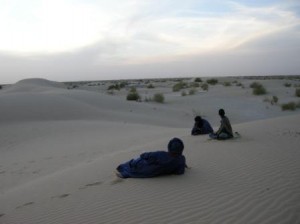 He raises his glass of cold champagne in the restaurant that is on the roof of the small hotel that is empty of guests, the small hotel in Toumbouctou, and to her he says, happy birthday.
He raises his glass of cold champagne in the restaurant that is on the roof of the small hotel that is empty of guests, the small hotel in Toumbouctou, and to her he says, happy birthday.